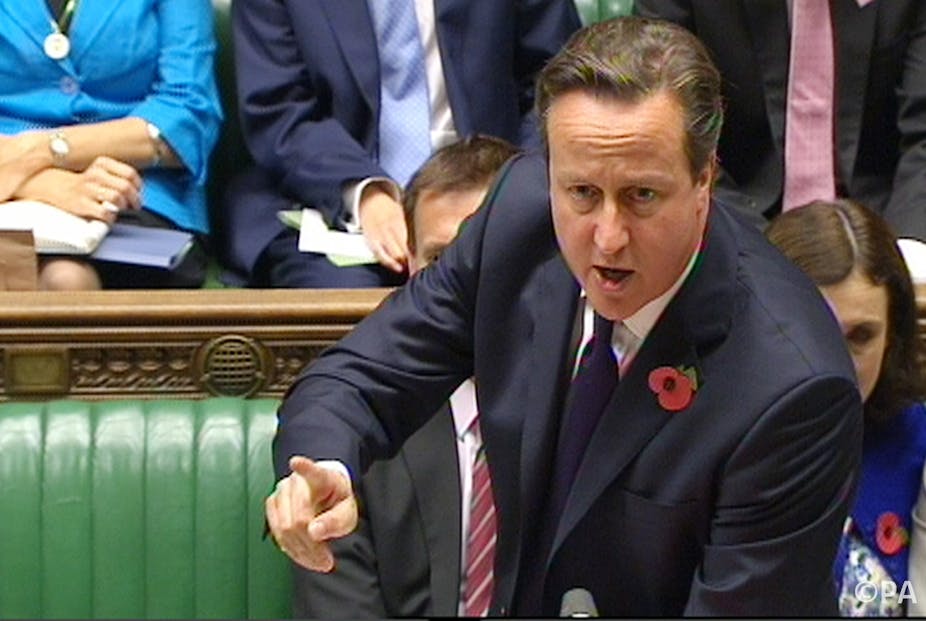David Cameron’s rage at being told he has to pay the European Union an extra £1.7 billion this year seems genuine enough, but this mini-crisis has also offered him a brilliant opportunity to unite his party around his bulldog fighting spirit. The relish with which he banged on his lectern and warned “I am not paying that bill” was all too apparent when he was presented with news. The same relish was even more evident when he addressed the House of Commons this week and vented his anger at those faceless Brussels bureaucrats who dared to ask something as unacceptable as paying his club membership dues.
It seems surprising that British civil servants – who supposedly run a Rolls Royce service – could forget to warn the prime minister about such an important development. However, blunders like this do happen, and more often than we think, as Anthony King and Ivor Crewe showed in their brilliant book The Blunders of our Governments. According to the Financial Times, the prime minister was only informed about the extra EU bill shortly before he arrived in Brussels for last week’s European council summit. But Treasury officials and ministers had been aware of the possibility of such a bill since at least March and the chancellor of the exchequer, George Osborne, had already been presented with it. They were simply hoping to come up with a strategy to handle this political bomb before warning the prime minister. It was just bad luck that the FT correspondents in Brussels were too diligent in their work and revealed all.
The timing for the breaking of this story could not have been worse. The Rochester and Strood by-election is just a few weeks away and eurosceptic MPs are becoming restless again as a result of UKIP’s popularity. But Cameron is using his indignation about the EU bill to rally eurosceptic rebels in his party around his patriotic cause.
Cameron has deployed this tactic before. His use of the veto at the December 2011 EU summit was not part of grand plan to defend Britain’s national interests. Indeed, it came as a complete surprise to the Liberal Democrat side of the coalition government. But, feeling cornered by his EU partners and under pressure from the eurosceptic wing of his party, the prime minister decided to press the veto button. He also felt the veto offered the kind of tickle eurosceptic MPs needed to (temporarily) calm them down.
As he predicted, the veto worked like a balm. Cameron was received as a hero by Conservative MPs when he returned to the House of Commons to give his account of the European summit. But in the meantime, the deputy prime minister, Nick Clegg, worked behind the scenes to nullify the contentious aspects of Britain’s veto. This manoeuvre did not escape the attention of astute MPs such as Bernard Jenkin, who pointedly asked the prime minister to say something about “the nature of the EU of which we are now a member, given that a subset of member states can bypass a veto and hijack the institutions for their own purposes”, but most Conservative MPs were satisfied with Cameron’s attempts. For a little while, the eurosceptic rebels did not make impossible demands of the prime minister.
This tactic may well work again. Some of the most rebellious Conservative MPs, such as Peter Bone, seemed sympathetic to Cameron’s plight and supported his strategy of demanding clarifications from Brussels. And while Conservative backbenchers vent their anger (and waste their energy) at perfidious Brussels, and while the European Commission and Eurostat take their time to answer questions about the methodology used to calculate Britain’s surprise bill, the prime minister can slip off to fight another battle.
What is clear though, is that this bill will have to be paid eventually. It is no use claiming that the extra surcharge is illegal or unacceptable. Member states know exactly how their annual contributions to the EU budget are calculated and they accepted the principle when they joined the club.
In the case of Britain, questioning the method of calculation is potentially controversial. Margaret Thatcher did, after all, negotiate the rebate at the Fontainebleau summit of 1984 on the grounds that the British economy was not as strong as other major European nations. And indeed, officials at the European Commission said that any changes to the methodology used to calculate member states’ contributions to the EU budget might raise questions) about Britain’s rebate.
So, Britain will end up paying the extra £1.7 billion, with perhaps a symbolic reduction as a result of accounting adjustments. But the payment will only take place after the deadline of December 1 – preferably when the FT’s Brussels bureau will have shut down for the Christmas break.

